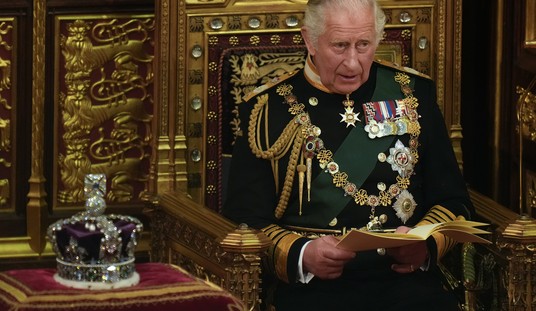Democrats have gone into mourning over the past 36 hours after seeing their last bastion of leverage in federal government wrested away from them. “Dark clouds hung over the White House,” wrote Jordan Fabian at The Hill, describing both the weather and the mood as Barack Obama prepares for a visit from Donald Trump today. “Now Obama must begin to hand the keys to the White House to a leader who has pledged to unravel much of his legacy,” Hill continues, while Democrats struggle to comprehend the fact that voters have ushered them into the wilderness — and not just on the federal level, but at the state and local level as well.
The Washington Post describes this as a “power outage,” and they actually lay the blame where it belongs — on Obama’s shoulders:
The biggest stain on Barack Obama’s political legacy may turn out to be the decimation of the Democratic Party on his watch.
The 2016 election has brought a moment of reckoning — and a new era to the party.
Democrats have been shut out of power in Washington, with the White House and both chambers of Congress in GOP control starting in January. In state houses across the country, their ranks have been decimated. …
What is undeniable, however, is that there has been a systematic erosion of Democratic power during Obama’s eight years in office, and particularly from the heady days of his early presidency.
That’s exactly correct, but it didn’t start in 2016’s election cycle. The backlash from the Democratic Party’s 2009-10 power surge began in Obama’s first midterm election. Republicans rode a massive wave to control of the House, putting an end to the big-government plans of the White House. Voters made it clear that they did not want a “fundamental transformation” of the country and put the GOP in position to block it.
At the time, some predicted that Obama would have to emulate Bill Clinton and “triangulate” in order to work on accomplishments with more consensus. Instead, Obama dug in his heels, and aided by a national media that clearly didn’t think much of voters outside of urban centers, painted his political opponents as ignorant rubes and worse. Thanks to his personal popularity and an underwhelming effort by Mitt Romney’s campaign Obama won re-election, but Democrats’ reach in Congress and in the states barely budged. And once again, Republicans rode a midterm wave that pollsters largely missed in 2014 to strip them of control of the Senate.
Democrats didn’t listen. Neither did the media. In my column for The Week, I point out that this election was a referendum on Obama, Clinton, and the establishment that have ignored these warning signs for years. That’s especially true when it comes to the nonsensical string of happy talk about Obama’s signature legislation:
If one wonders how the electorate got this angry, angry enough to elect Donald Trump, ObamaCare is a great case in point. Consider the pattern of Democratic disaster that unfolded after its passage in March 2010. Democrats lost the House in 2010 over it, then lost the Senate in 2014 largely on the same issue (among a few others). Obama has now presided over the loss of Democratic control over the White House, both chambers of Congress, a record number of state legislatures, and after last night, even more gubernatorial offices. Maybe refusing to deal realistically with popular opposition to government-run insurance markets had something to do with that, eh?
And then there’s the Senate. Before the start of this election cycle, the Democrats had licked their chops at the prospect of control in the upper chamber, where the GOP had to defend 24 seats to just 10 for Democrats. They drafted old warhorses like Evan Bayh and Russ Feingold to rally voters to their standards, and most media outlets focused their analysis on whether the change in Senate control would lead to an easy ride for President Hillary Clinton even if the GOP held the House. All Democrats needed was to flip four Senate seats, and the field brimmed with vulnerable incumbents and open spots.
Instead, Democrats only converted two opportunities — in Illinois and New Hampshire, giving them just 48 seats in the upper chamber. Bayh and Feingold didn’t just lose; they got blown out. Republican Sen. Pat Toomey eked out a win at about the same margin as Trump won in Pennsylvania. GOP Sens. Roy Blunt and Richard Burr will still be around in 2017.
Those losses in supposedly easy-opportunity races don’t just reflect Trump’s surprising political strength. They demonstrate the depth of the passion against the establishment — and that includes the media. Three weeks ago, I wrote that the election system wasn’t “rigged” against Trump, but media bias against him and Republicans in general had become painfully obvious — even as media outlets promoted Trump in the primaries to fill their wallets with advertising revenue. In the final month of the election, the same media picked up every attack line from Clinton in an attempt to shame voters into acquiescing to their worldview. Voters finally answered in the most direct way possible.
The WaPo analysis asks who Democrats have on their bench who can lead them back into competitiveness. Perhaps the first step would be to find someone who hasn’t been part of the old establishment — and a poster figure for corruption and influence-peddling — to crown as their leader. Maybe they should also find someone who listens to voters rather than reflexively painting them as rubes and bigots for opposing their agenda, and the media should follow suit. At least in the first 36 hours after this election, the prospects for learning that lesson look rather bleak.








Join the conversation as a VIP Member